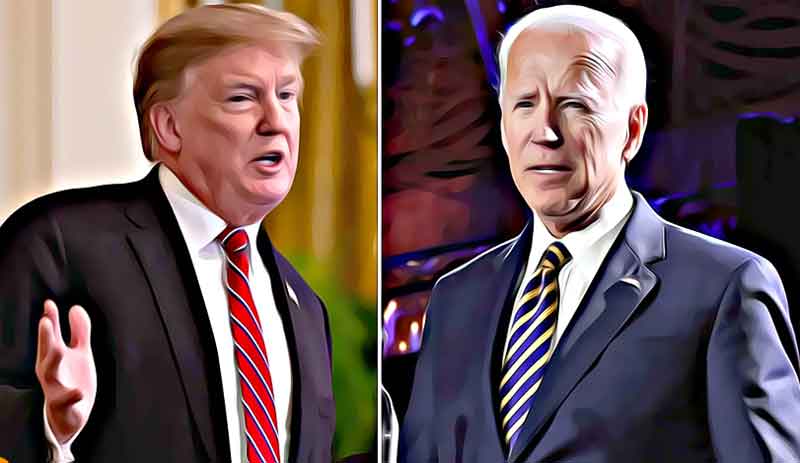
A key storyline of President Joe Biden's overseas trip was how different Biden was from President Donald Trump, and indeed he was — except in one crucial area.
Biden's hawkishness on China, which figured prominently during the trip, was a reflection of how fundamentally Trump changed our posture toward Beijing.
It is the ultimate victory for a politician if he doesn't just reorient his own party, but the other party — Ronald Reagan and Margaret Thatcher both did this, producing more moderate Democratic and Labor leaders in Bill Clinton and Tony Blair, respectively.
On China, Trump's wrenching shift in the U.S approach is now getting the ultimate tribute of broad acceptance by a successor who has nothing good to say about him and wants, in fact, to differentiate himself from him as much as possible.
It is impossible to imagine President Barack Obama during his time in office, just five years ago, pressuring reluctant European allies to take a tougher line on China, as Biden did over the past week.
Prior to Biden's trip, his top Asia hand at the White House, Kurt Campbell, said the era of "engagement has come to an end."
This is correct, and it ended in 2017, in what will likely come to be seen as the Trump policy that was most far-reaching and consequential.
For 20 years, the U.S. had operated on the bipartisan assumption that welcoming Beijing into the international system and establishing closer commercial ties would pay off in a liberalizing China.
By the end of the Obama years, it was increasingly clear that this strategy had come a cropper. The Obama team talked of a "pivot to Asia," or shifting attention and resources from the Middle East to Asia, but this was more sloganeering than substance.
Even as the Chinese invested massively in its military, encroached further on the South China Sea, continued to engage in cyber espionage and hacking, launched the Belt and Road Initiative, started to build its own international financial architecture via the Asian Infrastructure Investment Bank, and began its campaign of cultural genocide against the Uighurs, Obama remained accommodating.
The situation resembled the end of the Jimmy Carter years, when any hope of the Soviets moderating their behavior was blown away by the invasion of Afghanistan.
The old consensus on China had become unsustainable, but it took Trump, contemptuous of elite opinion and willing to blow things up (or at least talk about it), to demolish it.
For years, the security and trade relationships with China had been considered separate realms, or worse, we'd been afraid of pushing too hard on security matters for fear of upsetting commercial relationships.
Trump linked trade and security, and sent the message to the world that the co-mingling of U.S. and Chinese economies wasn't inevitable and indeed, could be reversed.
Trump over-personalized his relationship with President Xi and over-sold what might come of the trade war with China, but the reorientation was unmistakable.
As Josh Rogin of The Washington Post puts it in his book on Trump's China policy, "Chaos Under Heaven," "The Obama team had told China that the United States would alter its behavior to accommodate theirs. Now the Trump team was telling China that its behavior had to change."
Beneath the daily drumbeat of controversy from the top, Trump officials undertook a thoughtful, deliberate effort to set out a new strategy and begin to implement it.
The administration produced several important documents across government — from the Department of Defense, to the National Security Council, to the State Department — that crystallized the new thinking.
Secretary of State Mike Pompeo gave a battery of speeches highlighting China's malfeasance across the spectrum, while in the summer of 2020, Defense Secretary Mark Esper, Attorney General William Barr and FBI Director Christopher Wray all gave their own speeches about the Chinese threat.
The administration worked to buttress alliances across Asia and successfully lobbied European countries to exclude Huawei from its networks, as part of a broad pushback on all fronts, including defense, diplomacy, cyber, telecom, trade and human rights.
By any fair measure, this was a serious campaign and China's behavior in recent years has only underlined its necessity.
It would be foolish in the extreme to trash all of this only because it had the name "Donald Trump" attached to it. To his credit, Biden hasn't. It remains to be seen how tough-minded Biden really will be on China, but directionally, his push to get European allies on the record condemning Chinese malfeasance is welcome.
Biden's bonhomie with Emmanuel Macron and Angela Merkel on his trip was fine as far as it went, and a marked difference with Trump.
More important, his emphasis on what might be the defining confrontation of the first half of the 21st century owed a debt to Trump and made an implicit nod to the enduring strategic transformation brought about by his predecessor.
(COMMENT, BELOW)


 Contact The Editor
Contact The Editor
 Articles By This Author
Articles By This Author